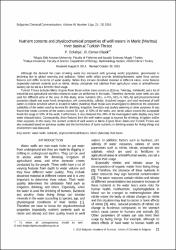Nutrient contents and physicochemical properties of well waters in Meric (Maritsa) river basin at Turkish Thrace
Özet
Although the demand for clean drinking water has increased with growing world population, groundwater is declining due to global warming and pollution. Water wells which provide drinking/domestic water have various features and differ in terms of water quality. While they include dissolved material at different ratios; some features (especially nutrient contents such as nitrite, nitrate, phosphate and sulphate from agricultural areas or animal/human wastes) can be set as a limit for their usage. Turkish Thrace includes Meric-Ergene River Basin within three provinces (Edirne, Tekirdag, Kirklareli) and a lot of industrial and agricultural activities related to water are performed in the basin. Therefore, domestic water wells are also used for different aims in the area. In this study, some nutrients (SO4, o-PO4, NO2-N, NO3-N) and physicochemical properties (depth and water level, temperature, pH, conductivity, salinity, dissolved oxygen, and total hardness) of well waters in Edirne province which is located in Meric (Maritsa) River Basin were investigated to determine the utilization suitability of the waters used by humans for drinking, irrigation, livestock and poultry watering or other purposes. It was found that nitrate contents of the waters exceed 50 mg/L in 65% of the wells, and nitrite values exceed the acceptable levels for usage in 50% of the wells. Furthermore, it was observed that 44% of the investigated wells display very hard water characteristics. Consequently, these features limit the well waters usage as sources for drinking, irrigation and/or other purposes. In this study, the nutrient content of well waters in Meric-Ergene River Basin and Turkish Thrace was also evaluated based on previous studies and the harmfulness of some nutrients in drinking waters for living things and environment was discussed.


















